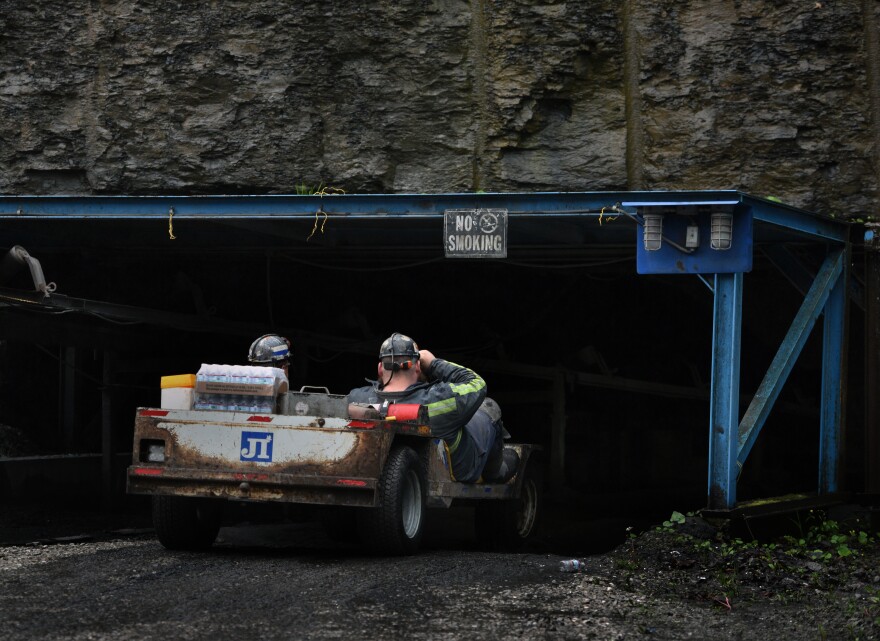This story is part of a series on coal country by NPR's Embedded podcast. Episode audio is below.
On May 5, 2016, Donald Trump led a campaign rally in Charleston, W.Va.
He put on a hard hat and pretended he was shoveling coal. The crowd loved it.
And he made a promise — a variation on one he had been making throughout the campaign — to coal miners.
"Get ready," he told them. "Because you're going to be working your asses off!"
With that, he set himself apart from his opponent, Hillary Clinton.
In a moment that is now considered to be one of the biggest mistakes of her campaign, just two months before, Clinton had infamously told a town hall in Ohio: "We're going to put a lot of coal miners and coal companies out of business."
That quote was part of a larger plan to reinvest $30 billion in the region. But the only thing most folks heard was "out of business."
In the end, the coal counties of central Appalachia voted overwhelmingly for Trump. (Though they didn't decide the election for Trump. White people without a college education, namely in Michigan, Wisconsin and Pennsylvania, did that.)

We actually started going to the region just before the election, when most people still thought Clinton was going to win.
We wanted to know what it feels like to live through the decline of an industry, the loss of so many jobs.
Then, after Trump was elected, we wanted to see whether his promise would come true:
Did those miners end up working their asses off?
The "red hat"
Kyle Johnson was driving around southwestern Virginia in his white Dodge Ram in February 2017 when he heard a radio ad for jobs in a coal mine.
"I just turned the radio up," Johnson says. "I was like, 'Yeah!' "

Johnson couldn't remember the last time he had heard coal companies advertising on the radio. He had wanted to be a coal miner since high school.
He even dropped out of college in 2015 to try to get a coal mining job. His family and friends wanted him to get a degree, but school just didn't hold his attention.
Plus, coal jobs often pay more than what his friends with college degrees are making, and he just didn't see the point of school.

So by 2017, that radio ad felt like vindication.
"I don't think anyone here in the coalfields thought [Trump's] going to bring back every job," says Johnson. "But ... I think everybody thought maybe he's going to bring back my job."
Since Trump was elected, there has been a bump in coal jobs in Virginia and a handful of other states.
That's in part because of the coal companies' new confidence in Trump, but also because demand for metallurgical coal — the kind used to make steel — went up, mainly in China.
(Energy analysts say thermal coal plants, the ones that produce electricity, are continuing to close around the country.)
For Johnson, it doesn't really matter why there are jobs.

After hearing that radio ad, he spent months driving around and handing out résumés.
In December 2017, he got a job at a mine. He started as "red hat," or a rookie in training.
Now he works long hours on the overnight shift. He calls his mom every time he makes it safely out of the mine.
"It's not an easy life here," he says. "But I think it's about the best life you can have."
The operator
Gary Dotson is a coal operator. That means he's like a contractor. Big companies that own the rights to the land contract him to mine the coal.

In the good years, Dotson did well. He bought a second home on a lake. But in the lean years, it's tough.
Still, Dotson managed to survive — until the most recent downturn, during the Obama administration.

The company he had contracted with cut what it had agreed to pay Dotson. So Dotson and his partners cut their own salaries by 20 percent. They cut the employees' salaries by 10 percent.
They eliminated the employees' health insurance.

"And then we just said ... if we have to cut them anymore we'll just quit," Dotson says.
Until Trump got elected — and the price of metallurgical coal started going up.
Dotson is still locked into his current contract. But he thinks things will get better, soon, like a renegotiated contract, or a second contract with a new company.

We ask Dotson's partner Barry Estep about all this.
"Maybe this is light at the end of the tunnel we've all been hoping for," he says.
By "this," he means Trump.

Still, as the months go by, the situation with the company that owns the mining rights does not improve.
Dotson and his partners have managed to keep operating, but every month it seems like they might be on the verge of shutting down.
The skeptic
Brad Pennington liked growing up in the mountains of Buchanan County, Va.
"It's the kind of stuff you'd pay $20 a movie ticket to go see on a big screen somewhere," he says.
But as he grew up, a county that had been one of the wealthiest in the country declined as the coal industry declined.
Pennington decided it would never come back. "There's nothing here," he says. "It's slowly dying."

After high school, Pennington worked at Walmart, tried community college, dropped out, worked in a scrap yard, then worked for a little while as a security guard at a coal mine.
But a guy died in the mine, and Pennington got spooked. He heard layoffs were coming, so he quit.
When we met him, Pennington worked the front desk at a hotel, on the night shift. He lived with his parents, while most of his high school friends had already left the county.

"It scares the s*** out of you, if you don't mind me saying that," he says. "I mean if you got fired tomorrow or quit tomorrow there's absolutely no opportunity to get another [job]."
Even though there has been an upturn in coal, Pennington says it's just a blip. Coal is not going to make a big comeback, he says, like Trump promised and people believed.
"You can't ... keep propping it up and hoping for it to last forever because it won't," he says.

So Pennington thought the best thing he could do was leave the county. And he did.
He moved to the next county over, got engaged to his girlfriend and got his own apartment.
He landed a new job, too. It pays almost $3 more per hour than the hotel did. He wants to use the extra cash to get a college degree and a "career I want to pursue the rest of my life."
The dreamer
Derek Akal's great-grandfather worked in eastern Kentucky as a coal miner. So did his grandfather. And his grandmother. His family is African-American — and they weren't exactly outliers.

All across central Appalachia, the black population grew in the early to middle 20th century. In the Akals' hometown of Lynch, Ky., black families made up 35 percent of the population at one point.
(The town is named after Thomas Lynch, who used to run a coal company.)
But Akal does not want to be a coal miner. He wants to move to Los Angeles to pursue a new career — maybe the solar industry; maybe modeling; maybe even race car driving.

He says the recent promises by Trump to bring back coal — and the recent upturn in coal jobs — are not for him. Those promises and jobs, he says, are for white people.
"Honestly, I haven't seen a black coal miner in years," he says.
Akal is skeptical, too, that coal will make a comeback.
As for the situation in Lynch, he says, "I haven't seen anything different."
The couple
Rema Keen grew up in Buchanan County.
Over the decades, a lot of her relatives worked in coal. Years ago, Keen and a co-writer turned the life of Keen's grandmother Teddy into a play.
Teddy married a coal miner named Clyde. Teddy and Clyde had seven kids, and when Teddy was pregnant with the eighth, an explosion in the mine killed Clyde and 36 other miners. It was 1957; the family got $50 compensation.

Keen traveled all over the U.S. doing the play about Teddy and Clyde.
Then, a few years ago, she decided she wanted to come back to Buchanan County and live in a little old house on her family's land.
She says coming back, she started to understand why people feel so strongly about so many coal jobs going away. "It's an immediate need," she says. "I understand where they're coming from."
After she moved back to Buchanan County, Keen met Susan Stancill on a dating site. When Stancill asked Keen where she lived, Keen said, "Well it's not the end of the world, but you can see it from here."

So Stancill, who is from North Carolina, came to live in Buchanan County, too. (Now they live there part time.)
Stancill learned to shoot a .22 rifle and kill rodents. She says her time in the county has taught her how to listen, too. "I have come to understand that ... where you stand depends on where you're sitting."
Stancill works for a Democratic candidate for Congress, a few counties over. She believes the only way to change the narrative in the coal counties is to remind people that hard times are not all the government's fault.
The coal industry is to blame, too. "We need to take a longer view and invest in a longer thing," she says.
Benny Becker of WMMT and the Ohio Valley ReSource contributed reporting to this story.
Copyright 2023 NPR. To see more, visit https://www.npr.org.



